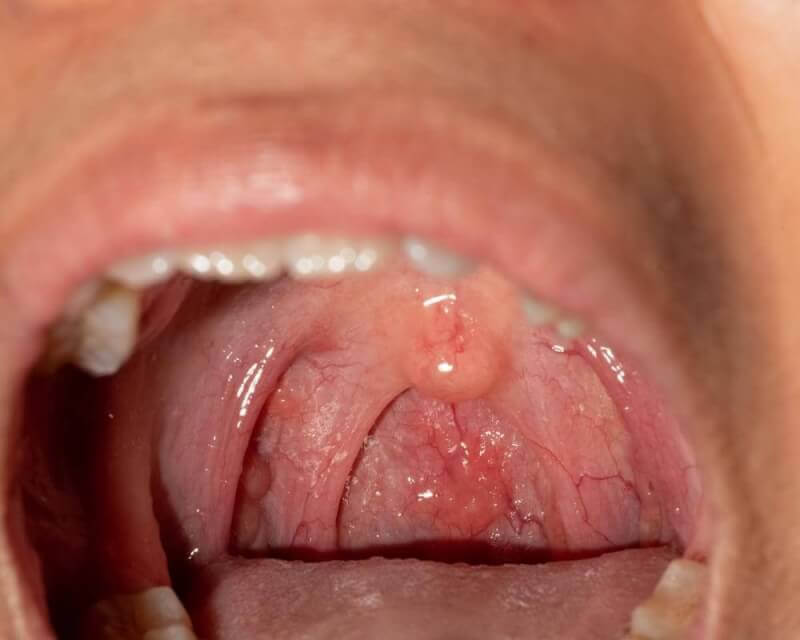What is small uvula (uvulitis)?
The small tongue, medically called the uvula, is elongated due to various reasons. This condition is also called small tongue elongation. The small tongue, which ensures that sounds and words come out correctly, also prevents food from escaping into the windpipe or nose. It is also involved in preventing pathogens from entering the body. In the case of a small tongue growth for which there is a cure, medical advice should be sought.
Diagnostic criteria for small uvula (uvulitis)
Physical examination and the symptoms seen in the patient are sufficient for the diagnosis of small tongue elongation. Since the small tongue, which is located between the tonsils behind the soft palate and consists of muscle tissue, can be seen with the naked eye, special techniques are not needed for diagnosis. However, external examinations are needed to identify the causative factor of small tongue elongation.
Causes of small uvula (uvulitis)
The soft tongue may swell or elongate for various reasons. While some of these changes do not cause significant problems, some of them cause serious symptoms that make it difficult for patients to breathe. Among the reasons that cause elongation of the small tongue are the following:
- Advanced age
- Smoking and drinking alcohol
- Irritating foods
- Upper or lower respiratory tract infection
- Consuming very hot or cold food and drinks
- Ear, nose and throat infections
- Fatigue
- Allergic reactions
- Muscle relaxants
- Antidepressant drugs
Symptoms of small uvula (uvulitis)
Small tongue elongation, which can also be called prolapse of the small tongue, is extremely important both for the protection of the body against diseases and for speech function. For this reason, small tongue elongation causes various symptoms. These symptoms include the following:
- Shortness of breath
- Feeling of irritation in the throat
- Cough
- Feeling of blockage
- Deterioration of sleep quality
- Sleep apnea
- Lethargy
- Snoring
Small uvula (uvulitis) treatment methods
Tongue elongation is a health problem that can occur suddenly or develop gradually over time. Sudden prolongation of the small tongue requires immediate medical attention. Sudden onset is usually caused by allergies.
Conditions that develop over a long period of time become chronic over time and cause problems such as breathing obstruction or snoring. In this case, surgical intervention is usually recommended. Once the underlying cause of small tongue elongation has been identified, the severity of the condition is determined. For mild cases of small tongue elongation, lifestyle changes are sufficient. However, surgical methods should be resorted to in advanced cases of small tongue elongation.
Lifestyle changes
Lifestyle changes are recommended in the treatment of mild cases of small tongue elongation. These changes include the following.
- Increasing daily fluid intake
- Avoid excessive smoking and alcohol consumption
- Doing regular sports
- Regulation of sleeping hours
- Getting down to ideal weight
- Reducing muscle relaxants or antidepressants under doctor's supervision
- Healthy eating
If these changes are inadequate for the treatment of a protruding tongue, surgery for a protruding tongue is recommended.
Small uvula (uvulitis)
In order for small tongue surgery to be recommended, the patient must first be examined in detail. The method to be applied in the operation is then determined. Criteria such as the presence of infection, the general health status of the patient and the amount of prolongation are effective in determining the method. The techniques used in small tongue lengthening include the following:
- Uvulopatal flap: cutting and shortening the small tongue and then folding and suturing the remaining part
- Reduction of the small tongue with laser or cautery
- Small tongue radiofrequency or thermal welding: the process of shrinking the small tongue by creating heat with radio waves
- Uvulectomy: cutting off the tip of the small tongue
Recovery after small tongue surgeries performed under both local and general anesthesia takes place quickly. No pain is felt during the operation. However, bleeding, tenderness and swelling may occur after surgery. When the numbness disappears after surgery, patients can start eating soft foods.
Is small tongue growth dangerous?
The elongation of the small tongue is a health problem that causes blockage of the air ducts. For this reason, people may experience various difficulties in breathing. Sleep problems can occur due to difficulty breathing. Finally, sudden obstruction of the airways during sleep is dangerous.










